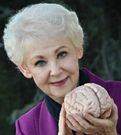Part 1 - Who Is The Doctor Within?
©Arlene R. Taylor, PhD www.ArleneTaylor.org

Dr. Albert Schweitzer famously said: “Each patient carries his own doctor inside him. We are at our best when we give the doctor who resides within a chance to go to work.”
Using this metaphor, everyone is a “patient.”
But who is this so-called doctor within?
Answer: your brain-body immune system, the most amazing healing mechanism on planet earth. Perhaps even in the known universe.
No doubt you have heard on the news about the two main risk factors related to whether a person gets sick from a virus or bacteria or other types of harmful organism.
One risk factor involves the type and length of exposure to a source of infection. Typically, someone with the illness or an environmental source such as contaminated objects or spoiled or infected food. That’s the important reason for implementing recommended prevention strategies—the basic ones at least, whether there is an epidemic or not. Calm vigilance and a prudent lifestyle are two of your best allies.
The other risk factor is the strength of your built-in healing system. That’s the reason for developing wellness habits that will keep the doctor within strong. Embracing a longevity lifestyle matters.
According to Neil Nedley, MD: “Your singular duty to the immune system is to develop a lifestyle that will support its constant defense work on your behalf. How you live day by day determines whether your immune system works at peak levels or is inhibited by neglect and even abuse.”
Your brain-body healing systems are very closely connected. If healthy and sound, they function as one coordinated system. They “communicate” with each other regularly. Think “social media” here: text, tweet, email, Instagram, phone, and Facebook messaging. One writer put it this way: “Their hands are shoved so deeply into each other’s pockets you can’t tell which is which.” That’s both good news and bad news. Good news because what happens in the brain impacts the body—and vice versa. Bad news if one or both are not in tip-top shape.
The doctor within has four main jobs:
- First - To recognize both the “self” (that’s you) and what is not you. This could impact organ transplants if the immune system says, “Hey, that’s not you!” and tries to destroy the transplanted organ. Sometimes the immune system gets its wires crossed and makes a mistake by misidentifying and turning against a part of you by destroying your own cells—as if they were an actual enemy. Autoimmune diseases, for example.
- Second - To destroy foreign invaders such as viruses, bacteria, fungi, and toxins.
- Third - To destroy internal mistakes or mutations, such as cells that have gone rogue and tiny collections of cells forming tumors.
- Fourth - To keep things tidy and clean. For example, pus from infected tonsils or a “hot” appendix.
In 1986 the newly formed science of Psychoneuroimmunology began to formally investigate the two-way links between the brain-body immune system and the endocrine or hormone system and to learn how this impacts illness and wellness.
Let me repeat: your immune system is the most amazing healing system on planet earth. It is your doctor within! However, its level of effectiveness is typically tied to your lifestyle and habits of everyday living—just as the effectiveness of your car is linked with the correct gas or petrol and regular engine tune-ups.
Studies are revealing how you can give your doctor within a chance to go to work. That’s good news any time. Great news in a pandemic—especially if you have been strengthening your immune system on a regular basis.
It’s crucial to know and understand the components that make up your immune system. After all, if you tried to drive a vehicle as if it had an automatic transmission when it was a stick shift or vice versa, you might create havoc with some of the car’s parts.
By the same token,it is important to know something about your immune system. Of equal or greater value is knowing something about your brain. Without a healthy brain the body will likely be unable to accomplish a great deal. Without a healthy body, your brain would be limited in where it could go—if anywhere. Remember, the body’s main job is to support the brain and transport it from place to place safely and efficiently.
Do you know the components that comprise the immune system?
See Part 2.

